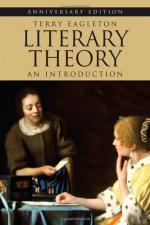
|
| Name: _________________________ | Period: ___________________ |
This quiz consists of 5 multiple choice and 5 short answer questions through Conclusion, Political Criticism.
Multiple Choice Questions
1. What are Northrop Frye's three recurrent patterns of symbolism in literature?
(a) Tragic, comic, romantic.
(b) Comic, apocalyptic, romantic.
(c) Analogical, demonic, tragic.
(d) Apocalyptic, demonic, analogical.
2. According to Eagleton, "Literary Theory: An Introduction" has managed to reach readers beyond __________.
(a) Academia.
(b) Students.
(c) Literature.
(d) Historians.
3. According to Roland Barthes, what kind of sign draws attention to its own arbitrariness?
(a) A productive sign.
(b) A healthy sign.
(c) An unproductive sign.
(d) An unhealthy sign.
4. According to the feminist philosopher Julia Kristeva, the language of the semiotic is a means of what?
(a) Affirming the symbolic order.
(b) Understanding the symbolic order.
(c) Reproducing the symbolic order.
(d) Undermining the symbolic order.
5. What person is NOT included in the ranks of Russian formalists?
(a) Roman Jakobson.
(b) Viktor Shklovsky.
(c) Boris Tomashevsky.
(d) Heinrich Wolffin.
Short Answer Questions
1. How many decades, according to Eagleton, has there been a "striking proliferation of literary theory" since the publication of the Russian formalist's pioneering essay?
2. According to Eagleton, the French structural anthropologist Claude Levi-Strauss did pioneering work on what?
3. What kind of analysis is phenomenology, according to Eagleton?
4. What is the name of the Yale theorist who believed that all language is metaphorical?
5. What is the root of the present crisis in literary studies, according to Eagleton?
|
This section contains 241 words (approx. 1 page at 300 words per page) |

|




